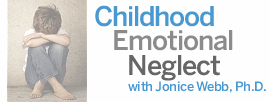The 5 Uncommon Strengths of the Emotionally Neglected
- Details
- Written by AndEl

With their heads held high but their spirits lower than should be, they walk among us.
“I don’t need any help,” they say with a smile.
But “what do you need?” they ask others with genuine interest.
Loved and respected by all who know them, they struggle to love and respect themselves.
These are the people of Childhood Emotional Neglect (CEN).
What is Childhood Emotional Neglect, or CEN? It’s a simple but powerful force in the life of a child. All it takes is growing up in a household where your feelings don’t matter enough.
Typically, I write about the special challenges of the emotionally neglected, such as self-blame, self-directed anger, and low self-compassion. That’s because I want to help the people of CEN overcome them.
But truth be told, the emotionally neglected are some of the strongest adults I have ever met.
Yes, it’s hard to believe, but there is a bright side to growing up emotionally ignored.
So now I’d like to highlight the particular strengths you likely have if you grew up this way.
The Five Uncommon Strengths of the Emotionally Neglected
- Independent: Growing up you knew, even though it was perhaps never said out loud, that you were essentially on your own. Problem with a teacher? You solved it. Conflict with a friend? You figured it out yourself. Your childhood was a training ground for self-sufficiency. Now, as an adult, you prefer to do things yourself. Because you’re so very competent, the great thing is that for the most part, you can.
- Compassionate: As a child your feelings were far too often ignored. But that probably didn’t stop you from feeling for others. Research has shown that even young babies feel empathy. I have noticed that many people who were emotionally neglected in childhood have decreased access to their own feelings, but extra sensitivity to other people’s feelings. Compassion is a powerful, healing, and bonding force. And you have it in spades.
- Giving: Having received a dearth of emotional acknowledgment and validation in childhood, you learned not to ask for things. Part of being independent and compassionate is that you are more aware of others’ needs than you are of your own. So now as an adult, you don’t ask for a lot, but you do give a lot.
- Flexible: As a child, you were probably not often consulted. Instead of being asked what you wanted or needed, you had no choice but to adjust to the situation at hand. So now, all grown up, you’re not demanding, pushy or controlling. Instead, you’re the opposite. You can go with the flow far better than most people. And you do.
- Likable: The people of Childhood Emotional Neglect are some of the most likable in this world. Compassionate, giving and selfless, you are the one your friends seek out when they need help, advice or support. You are there for your family and friends, and maybe even strangers too. Others know that they can rely on you. Are you ever puzzled about why people like you? It’s because you have these five unmistakably lovable qualities.
Many CEN people are secretly aware of their great strength, and value it in themselves.
I don’t need help,
I don’t need anything,
I can handle it,
I’ll take care of it,
I’ll be fine with whatever you decide,
I’m strong,
they say.
If this is true of you, the idea of changing yourself can be frightening. You don’t want to feel dependent on anyone, including a therapist, friend or spouse. You’re afraid of appearing needy, or weak, or helpless. You have a grave fear of becoming selfish.
But here is the beauty of CEN: Your strengths are so enduring that you can make them even better by balancing them.
So you remain independent, but you lose your fear of depending on someone when you need to.
You remain as competent as you’ve always been, but you’re OK with asking for help when you need it.
You stay flexible and can go with the flow, but you are also aware and mindful of your own needs.
You can still handle things.
You’re just as strong as ever.
More balanced and more open, you’re still loved and respected by all who know you.
And the great thing is that now you also love and respect yourself.
Liked this article? Dive deeper into personal growth and wellness! Check out CrystalWind.ca for spiritual wisdom or explore AromaWorx.ca for natural well-being tips. Spread the positivity—share this with friends on their happiness journey!
Let’s Chat! Drop Your Thoughts Below! ![]()
Related Articles - Journey
Latest Articles
Dive into the Mystical World of the Crystal Wind Oracle Deck!
Get All the Enchanting Details Now!
NEW Expanded Boxed Edition!
Now with 58 Cards for Richer Wisdom!

Imagine a world of inspiration and healing, free for all—made possible by YOU!
Donate Now—Ignite the Magic at CrystalWind.ca!

Epilepsy - Finding A Cure
Your donation can make a difference!
Help us find a cure – donate now!
Unlock Your Light: Join Lightworkers Worldwide on CrystalWind.ca!
Follow Us!
Featured This Month
Peridot: The Healer's Stone
Peridot has been used as a Power Stone for centuries. Peridot fosters emotio... Read more
Crystals for Virgo
As the warmth of summer begins to soften into the crispness of autumn, the Sun... Read more
Mabon Magic: Ideas For Fall Decoration And R…
Welcome (almost!) to Fall! We’re turning the Great Wheel once again, toward ... Read more
The Vine: September 2nd - September 29th
The Autumnal Equinox ( Alban Elfed ) Celtic Symbol : The White Swan Read more
Watermelon Tourmaline
Synonym: Rainbow Tourmaline The watermelon tourmaline is a rare variety t... Read more
Sun in Virgo
An Overview of Sun Sign Characteristics for Virgo Virgo is guided by Mercur... Read more
Sweet Violet
Sweet Violet Faithfulness and modesty. “I will always be true to you.” Helps... Read more
Virgo Mythology
The Virgo Myth In all of constellation mythology, few legends are as misund... Read more
Mabon in Modern Times: Fresh Takes on the Au…
The Mabon season begins somewhere around the 21st-22nd of September and cont... Read more

















































